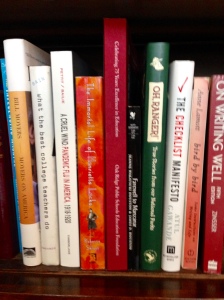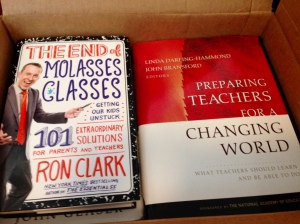I am a book enthusiast.
I was an undergraduate English major and spent my career as a teacher who amassed quite a collection of books.
Most of the books I’ve gotten in the last five years have been audiobooks or digital, but the majority of my book collection consists of hardback and paperback books.

Deciding which books to keep and which to part with definitely is a challenge.
Even for those of us who love books, there are times when we may need to eliminate some of our books.
When I retired as a faculty member at the University of Florida and was clearing out my office, I was very aware that I had a lot of books. And those were my academic books, not my personal library that was at home.
I continue to review my books and decide which books to keep and then what to do with the others.
Several years ago, I read part of Marie Kondo’s “The Life-Changing Magic of Tidying Up “ and decided she was too ruthless for me in her decluttering approach. So I didn’t see her “Tidying Up with Marie Kondo” show on Netflix that inflamed many book lovers. Since that program, she has tried to clarify her comments about discarding books.
[Update: Thanks to Margaret Dilloway for her explanation of the cultural and religious foundations of the approach Kondo recommends for assessing one’s possessions.]
Shelves filled with books can be a joy – reminding you of special books you’ve valued reading or books yet to read.
If you don’t need the space or aren’t thinking ahead to a move or downsizing, you may not need to review your collection of books. But you may want to downsize some books if for no other reason than to free space for new books.
Try to review your books when you aren’t in a rush so you can give each book at least a few moments of consideration.
- Will you read the book again or possibly use it as a reference?
- Was the book a particular favorite?
- Is it a book you haven’t read but think you really might read?
Suggestions for books you can part with
If you decide that you can part some of your books, you have several options.
Gift books to those who would enjoy them.
In reviewing the books from my college office, I did keep some to reread or have for reference. But I realized that most of my academic books weren’t going to be part of my life moving forward.

Here’s part of a collection of books I’m mailing to my cousin who is an elementary school assistant principal.
I considered which books could be useful to graduate students who had been teaching assistants with me and now are faculty members.
I boxed up the books and mailed the books to them. The US Postal Service offers a Media Rate that is a less expensive way to ship books.
On one trip to the post office, a postal worker who had helped me mail boxes of books previously asked me if I owned a bookstore because I’d been mailing so many books.
You may want to check with people in advance before you mail the books. When I did that, I received delighted responses — especially from those who were new college faculty and trying to build their own collections of books for their offices.
A few let me know that they already had a copy of a book that I was going to send. I could then gift that book to someone else or tell them to pass the book along to a colleague.
Sell or trade your books. Some bookstores buy used books or offer store credit. You may be disappointed in the amount you receive, but you have moved the books off your bookshelves. If you think you have a real collector’s item, check online.
I traded my collection of Sue Grafton’s Kinsey Millhone Alphabet Series (A-Y – some hardback, some paperback and some audiobooks) at a great local bookstore for store credit. Two of the books I’ve purchased with that credit are Lyanda Lynn Haupt’s Mozart’s Starling and Richard Powers’ The Overstory.
Donate your books. See what organizations in your area accept book donations. You may have a Friends of the Library Society. Goodwill and the Salvation Army also accept used books.
I donated poetry collections, anthologies of literary periods, and novels to my local Friends of the Library, which accepts donations year-round and hosts two books sales each year. The funds from the book sales go to support the county libraries and area literacy programs. That certainly made me feel good about parting with several boxes of books.
Make a “Free Books” box. When faculty were retiring or leaving the college for other opportunities, they often would create a “Free Books” box, either on the hallway or taking books to class for students to select books.
The many benefits of reading books
I’ve just finished another round of reviewing my books and will be going to the post office and Friends of the Library.
As I reviewed the books…
I thought of inspiring courses I’ve taken as a student and engaging class discussions I’ve had with my own students.
I remembered days and nights of eager reading to finish a real page-turner.
I appreciated books that encouraged a new idea or outlook, an appreciation of others, an understanding of another time period, religion or culture.
I thought of countless conversations with family and friends about books and authors.
I appreciated how books have encouraged me to be a life-long learner, including providing insights into the challenges and new opportunities that have unfolded in my life.
I considered how books I’ve read have helped me form views, deal with problems, and set goals.
For all those reasons, parting with books can be difficult. But I hope the books I’m gifting and donating can be a positive force for those who will have my former books on their bookshelves.

Your gift book “Little Girls in Pretty Boxes” was invaluable in helping me see the damage competitive gymnastics was doing to my daughter’s body. Thank you so much for passing it along!
LikeLiked by 1 person
Bonnie – When I saw that book on the shelf of books I’d compiled while co-directing the college’s Sports Communication master’s program, I thought the book would be of interest to you and your daughter. So glad you found it helpful.
LikeLike
Thank you, Julie, for these good suggestions. I’ve downsized my book collections several times, and passed books to mentees or students or younger coworkers. One donation choice I have done that I didn’t see mentioned in your post is Little Free Libraries, the book boxes located in neighborhoods, sometimes at schools, and in other interesting places. I helped to start and stock one (which I continue to donate to, not always taking a book but leaving several) sponsored by the Geist Institute for Women’s Words. It’s home is at Muddy Creek Cafe and Music Hall in Bethania, NC. I have learned the joy of passing along books that have meant something to me too.
LikeLiked by 1 person
Kay, thanks for adding the suggestion about another great location for donating books — Little Free Libraries. There’s a Little Free Library in an residential community on the way to the gym. I’ll have to drop off a book from time to time when I’m going to a workout.
LikeLike
One of the negatives of the digital collection of I now favour is I can’t share as easily,
LikeLiked by 1 person
Jeremy – Thanks for raising this issue about digital books. Digital books are so much more portable and don’t take room on the bookshelf. But as you say, digital books are more difficult to share. In deciding whether to get a book in print or digital format, a major factor in my decision is whether I think I would like to pass this book to someone after I’ve read it.
LikeLike